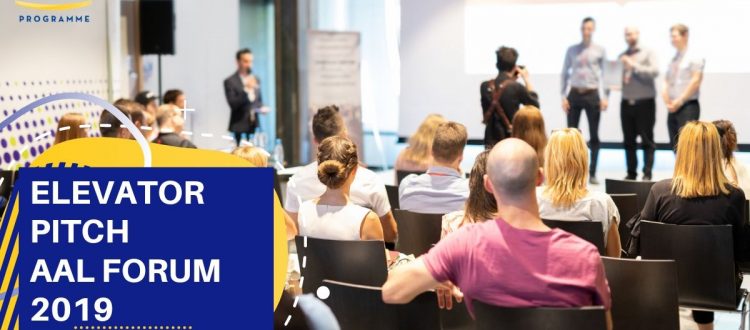Elevator pitch – sell your idea in six minutes
This year, the AAL Forum is bringing you a brand new format – the elevator pitches.
We are going to give the stage to six different groups for six minutes each, giving them the opportunity to pitch their ideas in a short, snappy and engaging way to the audience. The intention is to spark interest across the audience and create further debate and discussion with other interested participants.
Here we will provide you with a short taste of what each pitch will be about.
Person-centred involvement of dementia patients and family carers in enabling technology design
In the WHO European Region, dementia is the leading cause of dependency and disability. Dementia currently affects around 10 million people in the region, and its prevalence is expected to double by 2030. It also places a burden on regional economies with estimated costs of US$300 billion per year. Enabling technology is not always fit for purpose in many fields of active and healthy ageing, but especially so in dementia cases.
For example, people with dementia may have specific needs relating to technology co-design on their ability to:
- understand what is being asked of them
- make decisions
- anticipate the progression of their condition and future needs
- adapt to changing needs
- grasp technological functions
- follow instructions
- appreciate the interoperability of technologies
accept privacy and dignity parameters of technologies.
We hope to explore these issues related to people living with dementia and their relation to the development of technology.
Speakers:
Tracey Williamson
Shirley Evans
Developing robot-like eHealth solutions with end users in real life healthcare settings
Medical Delta Living Lab Care Robotics understands that there is often a gap between the development and the use of technology by older adults and caregivers which is why they are aiming to enhance a solution to cater for this problem.
This is a collaboration between universities and care institutions to develop and test new products together with end users in real life settings. The Living Lab follows a unique methodology with a mix of participatory action research and co-design, where social sciences are combined with engineering, and which centre around the patient, client, care professional and family-members. They also deal with ethics, legal issues and extensive assessments.
Medical Delta Living Lab Care Robotics offer applied research at care institutions in the Netherlands with some products piloted across Europe, and are interested in starting a collaborative project with like-minded parties.
Speakers:
Janneke Vervloed
Erwin de Vlugt
Ad Blom
Supporting active and healthy living among older adults through the use of animation
In Viborg municipality, we see animation as a form of entertainment and a way to tell stories for children, but also as a modern, engaging and democratic communication method we actively use throughout our life.
Animation comes from the Latin animatio, which means giving life or spirit – and this is at the core of Viborg municipality’s animation strategy. Here, animation is seen as a way to breathe new life into communication with citizens and a way of implementing new solutions. Animation is an effective tool in explaining complex problems for everyone to understand, speaking to both the brain and the heart. Two living cases will be shown as examples of animations that add value to public communication. We want to show how to communicate visually rather than with words, and how to reach your audience and step out of the comfort zone in communicating to patients and citizens.
Speakers:
Henriette Svenstrup
Digital design for the last stages of life: Thinking about ‘slow questions’
An end to life is inevitable. However, numerous aspects of dying have changed drastically over the last fifty years. The yearly number of deaths have doubled but so has the length of time people are aware of their life’s end. In these cases, it’s the medical questions which overshadow the more existential questions, but there is increasing awareness of the importance of the ‘slow questions’: Am I afraid of dying? What legacy am I leaving behind?
It is understood that people feel more empowered to make end of life decisions when they have thought, and talked about these questions. Unfortunately, statistics show that 80 per cent of Dutch adults find it difficult to discuss topics surrounding death and dying.
We want to design a digital intervention for people in their last stages of life which facilitates the interaction between patients and loved ones and enables them to discuss ‘slow questions’, with the goal of improving the quality of palliative care. Designing for the last stages of life is still complex as little is known about how people deal with existential questions during this period. To aid this development, experts from the creative industry and those in palliative care will combine to create valuable experience design.
Speakers:
Teun Aalbers
Karin Alfenaar
Intersecting the narratives of male caregivers
Despite the tendency of discussions around care being linked to the female sphere, it is our responsibility as researchers, policymakers and varying actors involved in the care sector to pay attention to emerging social dynamics. This presentation will address the lack of studies on male perceptions in care from an intersectionality analysis: beyond gender, class and experiences of racism and discrimination. I will focus on the experience of male immigrant caregivers in the Basque Country, Spain and as a result of their stories I have created three typologies of caring. This will aim to provide an insight of how male carers work today and how their insights and subjectivities might help to create and develop a clearer and broader understanding of care for society.
Speaker:
Julia Aguirre
Incontinence in older age: Preventing or coping with it through the help of digital tools
One in three people will deal with incontinency problems during their life, most of them elderly. In the Netherlands, approximately 60 per cent of those that suffer from incontinence seek medical help, leaving 40 per cent who do not. The reasons for this are that incontinence is a taboo, which leads to people not speaking about it and remaining uninformed about how it can be treated.
We believe eHealth is a great tool in solving both problems. People can anonymously ask about incontinence and find information about proper treatment, helping to lift part of its taboo. To take this further, we hope to learn and collaborate with other countries on this very prevalent issue in older adults.
Speakers:
Mark Slager
Willem-Jan Renger
Karin Alfenaar

